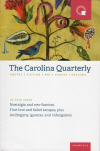The Carolina Quarterly – Fall 2013
Because of its length (about 133 pages), this issue of The Carolina Quarterly relies heavily on the strength of each of its components. Every sentence must move its alphabetical weight, more so than in one of those torrentially heavy volumes that seek to delight and have enough statistical room to dare to dismay—this collection is systematically frank and urgent.
Because of its length (about 133 pages), this issue of The Carolina Quarterly relies heavily on the strength of each of its components. Every sentence must move its alphabetical weight, more so than in one of those torrentially heavy volumes that seek to delight and have enough statistical room to dare to dismay—this collection is systematically frank and urgent.
I enjoyed Brandon Amico’s “Poem Beginning with a Line from Eugenio Montale,” perhaps because it does just that: “Upon me, upon you, and over the lemons”—and the miracle is that he keeps going, and going, and crescendos:
She cried first, then I cried
first. The cicadas overheard were a globe
of even thinner glass, near invisible. We had
our own names but those meant nothing; I exist
twice, I am both here and gone . . .
Leslie Bazzett’s short story “Preludes” explores the mutability of love when a step-daughter comes home from college and inadvertently throws her stepfather’s predictable, quiet life into disarray. Bazzett deftly recasts T.S. Eliot’s eponymous poem in his collection “Prufrock and Other Observations.” From the story’s beginning, a mosaic of memories lays the groundwork for the inevitable tension, and yet we see this Prufrock in the forgiving aura of Thelonius Monk and the Club Grandean in Brooklyn.
Bazzett creates empathy for the protagonist in the third person. The first-person point-of-view might have been an easier method to engender it, but doing so would have, to borrow from Eliot, “assured [us] of certain certainties.” The delicacy of her language, along with the elegance of her insights, achieves a compelling portrait. She writes of an “upside-down topographical map,” spelling out the devastating truth: “Was it then he first saw himself reflected in her? The solitary boy, wandering fatherless along the hallway.”
Aaron Apps’s nonfiction essay “Barbecue Catharsis” is successfully disgusting. He depicts a shockingly nauseating scene in a department store bathroom, not to mention two grotesque eating scenes and filthy sex. One might recall certain fictional scenes by Chuck Palahniuk. Of course, the essay is only graphic and lurid on one level, and on that level it conveys original shock in the preciseness of the description. The fact that Apps was able to pull it off as nonfiction is critical to the achievement. Many writers can describe epitomes of germy, finely imagined horrors of the everyday bodily function, but not many would be gutsy enough to create cinéma vérité out of it. It also functions successfully on other rays of the philosophical and canonical spectrums. I credit the writer and the press for daring to pull it off, thinking of Joyce and those other ‘foul’ dreamers blacklisted and banned for aesthetic innovation.
R. Jess Lavolette also innovated formally, integrating the format of a video game into fiction called “Leave Luck to Heaven.” The communications between the story and the player create compelling vignettes that are a pleasure to read in the carefully crafted prose, but the interspersions also help drive the movement of the message. I was impressed by the dialogue, which reads clearly even when there are elements of the interface adjusting the interpretation of inputs (such as the refrain “Select yes”). It is tougher than a villanelle but more instinctive than an American sonnet. The voice, characterization, and plot are highly original, and the structure remains understandable even if you have never played a video game in your life and suspect you will miss certain trade references. I don’t think you will; like great genre literature, it tells you enough to participate without betraying its ruse or neglecting its sleight.
Alexandra Reisner’s memoir “Nerve Damage” is more than a Craigslist heartbreak, although it may deliver such to a certain extent, and Manuel Martinez’ short story “What Presses Against Your Bones” will sustain you on the function and premise of memory through deep darkness. Juan Ramirez captures a kind of commentary on the volume’s cohesiveness head-on in his fine poem “Homestead”:
Homestead lies half-faced deep in muck
east of the Everglades,
his beard and cheek form fields of cultivated marl
where winter crops are ready for harvest.
As such, with all of the darkness notwithstanding, this journal’s spot-on prose and winning poetry make this magazine a sensible read for the oncoming spring.
[www.thecarolinaquarterly.com]





